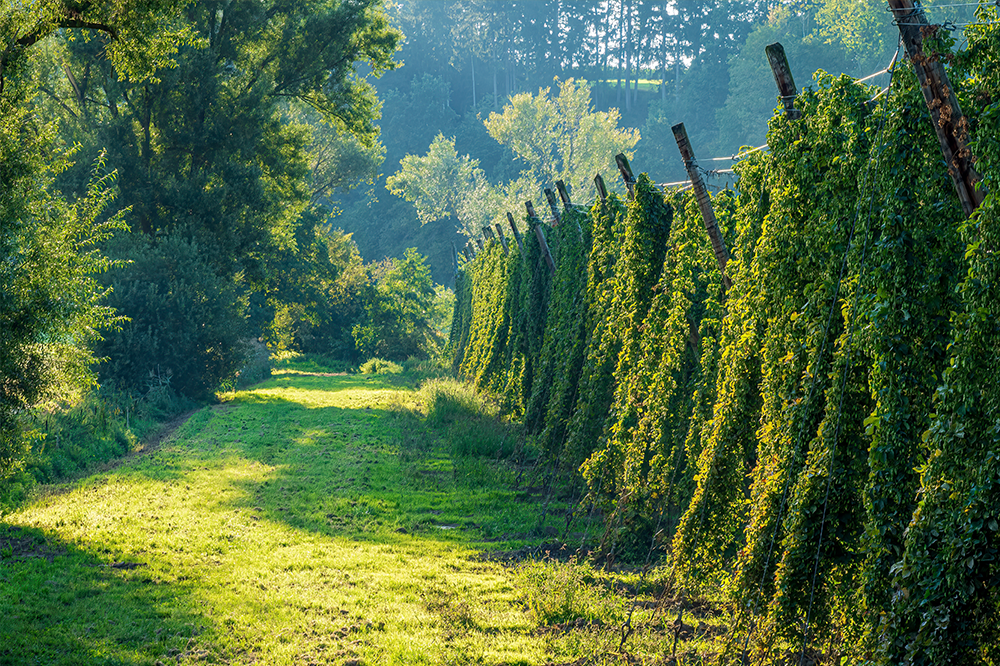The brewer Asahi UK is co-funding projects to explore sustainable innovations for British hop farming after analysis laid bare the future vulnerability of producers. By Nick Hughes.
Amid the grave threat posed to food and drink production by a warming climate, the success enjoyed by British-produced wines is often used as a counterpoint to an overwhelmingly negative prognosis.
Data published over the summer by trade body WineGB shows how more favourable growing conditions are encouraging investment in UK wine growing: 87 new vineyards were registered in 2023 bringing the total number to over 1,000 for the first time. The total area under vine now stands at 4,209 hectares, representing a growth rate of 123% in the space of just 10 years.
But what of another favourite British tipple, beer? Here, the trajectory is far less positive with climate change at least in part to blame.
Since its heyday in the 1800s, when it is thought there were almost 3,000 hop growers and more than 31,000 hectares of land used to grow hops in the UK, now there are just 45 hop growers covering around 800 hectares.
Climate change and the growing threat posed by pests and fungal disease has been one factor behind the substantial decline; another has been a shift in demand towards the tropical flavours offered by New World IPAs and other exotic brews produced from hops grown overseas.
The few UK hop growers that remain in business are coming under increased pressure from the risk of droughts and flooding, which can lead to a decrease in crop yields, along with other climate-linked threats.
Hops are particularly vulnerable to pests and diseases, especially a disease called Verticillium wilt which can significantly reduce yields. The stress and strain that more extreme weather conditions place on crops further lowers their resilience and thus increases their vulnerability to disease.
R&D funding
One of the UK’s biggest brewers hopes that new investment in research and development can help plot a brighter future for British hop growers. Asahi UK has teamed up with the Royal Agricultural University (RAU) and the University of Warwick to part-fund two PhD research projects aimed at exploring new sustainable innovations for British hop farming.
Working in partnership with the British Hop Association, hop supplier Charles Faram, and the Worshipful Company of Brewers, which is providing the majority of the funding through its brewing research and education fund, the two successful PhD students will work directly with growers to enhance UK hop production by increasing resilience to disease.
“Hop growers currently do what they can to prevent disease, and this includes the use of chemicals and regular cultivation of the alleyways between the hop bines,” says Professor Duncan Westbury, dean of land and property management at the RAU, who will be supervising the PhDs. “However, these practices not only significantly impact biodiversity and soil health, but they are also carbon intensive meaning that, while they may support the short-term production of hops, further increase the long-term problem.”
In a recent climate-related risk analysis of its business, Asahi UK, which brews British beer brands including Fuller’s, Dark Star, and Meantime, found that hops were one of the highest areas of risk due to the adverse impacts of climate change. Hop yields in Europe are expected to fall by between 4 and 18% by 2050, compared to average yields between 1989-2018, due to increased temperatures and reduced rainfall.
The research also indicated that hop alpha acid content, which is vital for delivering the bitterness and more complex fruity and floral flavours characteristic of British beers, will fall by 20-30% by 2050 under climate projections of hotter weather and more frequent droughts.
Among the potential solutions to be explored through the PhD projects are the tactical implementation of wildflower alleyways and the potential applications for biochar, a carbon-rich, charcoal-like material formed when biomass is heated in the absence of air.
The hope is that these methods could have multiple benefits such as helping the soil hold more nutrients, retain water in droughts, and improve drainage in floods. They may even lock up more carbon in the soil, thereby helping the industry towards the goal of net-zero.
“Hops are simply vital to all beer including the much loved and unique British varieties,” says Sam Goodenough, sustainability manager for Asahi UK. “We believe cross sector collaboration is key to identifying the solutions needed to safeguard the long-term future of hops and hop farming.”











